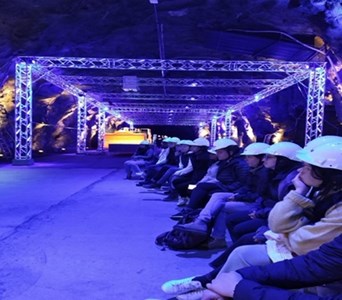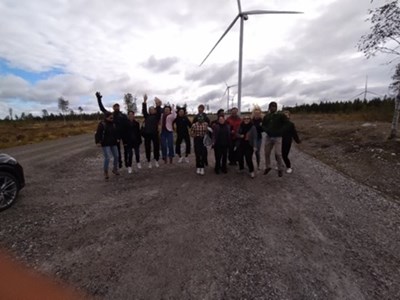The Academy is supported by a grant from the Prince Albert II of Monaco Foundation and organized through the UArctic Thematic Network on Arctic Sustainable Resources and Social Responsibility.
Within the overall focus of the Arctic Academies, the specific topic of this 2024 academy is: Towards a two-directional flow: Making expert knowledge meaningful to communities, translating community knowledge to decision-makers. The 2024 Academy is hosted by Memorial University (MUN).
The Arctic Academy promotes transdisciplinary research dialogue concerning the environmental, economic and social aspects of sustainability in the Arctic focused on the identification of solutions. While sustainability is the grand challenge of our time, the Arctic faces specific challenges due to its sparse population, fragile environmental conditions and abundant resources, which require transdisciplinary analysis. By advancing sustainability research in the Arctic context, the Arctic Academy will focus on two critical areas of human decision-making processes: (1) ensuring adequate rights holder and stakeholder involvement in decision-making, and (2) effectively addressing the social implications of the green transition for comprehensive sustainable solutions.
The outline of the event is:
- Thursday, October 10: Arrive in St. John’s, welcome reception (format to be determined).
- Friday, October 11: Academic intensive day at Memorial University St. John’s campus -introduction to participants and the Academy topic.
- Saturday, October 12: Travel from St. John’s to Happy Valley-Goose Bay, Labrador. This involves a flight of around 1,5-2,5 hours, depending on connection and transit.
- Sunday, October 13: Trapline Marathon community event. This is a significant community event with 5 kilometres, 10 kilometres, half marathon and marathon events. You don’t have to run but this offers a great opportunity to connect with the local community as a spectator, or even as a volunteer. Information, including registration and volunteer details: https://www.traplinemarathon.com/
- Monday, October 14: Excursion day (Canadian Thanksgiving holiday). We will make use of the opportunity to visit a local place of relevance to the Academy topic and /or to get to know local MUN colleagues.
- Tuesday-Thursday, October 15-17: Academic intensive days at Memorial University Labrador campus, with a focus on the Academy topic.
- Friday, October 18: Travel from Happy Valley-Goose Bay to St. John’s. Academic intensive day at St. John’s campus with reflections on what we’ve learned.
- Saturday, October 19: Student participants return home.
The Academy is geared towards advanced Master’s and Doctoral students and open to students from any part of the world with demonstrated interests in the Arctic and one or more themes of the Academy.
The Academy will be co-taught by UArctic Thematic Network on Arctic Sustainable Resources and Social Responsibility, as well as by faculty from Memorial University, St. John’s and Labrador campuses. We will also have sessions for learning from community presenters.

For the assessment, students will be required to write a discussion draft paper that integrates and applies 5 key readings that will be due 2 weeks before start of academy (September 26, 2024). Moreover, students will present a poster on the final day that integrates learning from the Academy and provides reflections on key points on two-way communication of knowledge. The paper and poster should address the research topic, knowledge and communication challenges, key insights, and take-home lessons. Posters will be uploaded to the academy website.
All students will receive a Certificate of Participation. European students requiring credit will be awarded 5 ECTS upon successful completion of the course. North American students will receive a course grade for a 3 SCH graduate level course; students choosing this option may register for a Memorial University course or may enroll on a Letter of Permission from their home institution. Credit arrangements may also be made for students from other geographical areas as appropriate. Students are strongly encouraged to contact their study abroad office or academic department in advance to learn more about their credit transfer policy. The language of instruction is English. More details about the course methods of completion can also be found on our webpage.
A C$100/75 Euro fee will be charged for participation in the Academy and payable upon acceptance into the course. Costs of accommodation and group meal expenses, as well as round trip travel between St John’s and Happy Valley – Goose Bay will be covered by the Academy grant. We will have bursaries (mobility support) for partial support for travel costs for international, national (Canadian), and provincial (from within NL) participants. The itinerary will begin in St. John’s, NL, Canada and from there students will travel together to Happy Valley-Goose Bay in Labrador. When thinking about applying, please take these logistical issues into careful consideration.
(On an indicative, preliminary and noncommittal basis, and conditional on students’ actual mobility support needs, we expect to be able to offer an average of around 1,000 CAD for international students, 500 CAD for Canadian students outside NL, and 250 CAD from students from NL.)
Doctoral or Masters students who wish to be considered for the Fall 2024 Academy must apply before the deadline of May 31, 2024. The application should contain a cover letter which outlines your research interests in the Arctic including which of the four themes identified above best reflects these interests (max 2 pages), a CV (max 2 pages) and an estimate of travel costs to and from St. John’s NL. In your cover letter, please indicate whether you wish to be considered for a bursary to support travel costs. The Scientific Committee will review all applications and notice of acceptance will be sent to applicants around 20 June, 2024. All applications must be submitted to mstoddart@mun.ca with Arctic Academy Application in the subject line.
If you need any further information, please contact Professor Mark Stoddart at mstoddart@mun.ca

The Academy is spearheaded by the UArctic Thematic Network on Arctic Sustainable Resources and Social Responsibility and co-hosted by the University of Helsinki, the University of Northern British Columbia, Memorial University, and Copenhagen Business School. The Academy is funded by the Prince Albert II of Monaco Foundation for a special and limited project lifespan of three years (2022 to 2025).
Arctic Academy for Sustainability 2024
